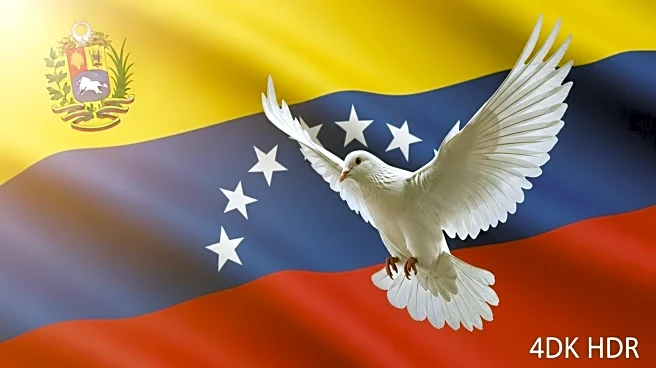What's Happening?
Maria Corina Machado, a prominent Venezuelan opposition leader, has been awarded the Nobel Peace Prize for her efforts in promoting democratic rights and advocating for a peaceful transition from dictatorship to democracy in Venezuela. The Norwegian Nobel Committee recognized Machado for her tireless work in defending freedom and democracy in a country where these values are under threat. Despite facing significant personal risks, including threats to her life, Machado has remained committed to her cause, choosing to stay in Venezuela while her family fled due to safety concerns. Her dedication to the struggle for democracy has been acknowledged internationally, and she has expressed gratitude to President Trump for his support of her efforts.
Why It's Important?
Machado's recognition with the Nobel Peace Prize highlights the ongoing struggle for democracy in Venezuela, a nation plagued by political turmoil and authoritarian governance. Her award brings international attention to the plight of Venezuelans and underscores the importance of global support for democratic movements. The prize serves as a morale boost for opposition forces within Venezuela and could potentially galvanize further international backing for democratic reforms. Machado's win also reflects the broader geopolitical dynamics, as her acknowledgment by the Nobel Committee may influence diplomatic relations and policy decisions regarding Venezuela.
What's Next?
Following her Nobel Peace Prize win, Machado is likely to continue her advocacy for democratic reforms in Venezuela, potentially leveraging her increased international profile to garner more support for her cause. The recognition may also prompt further diplomatic engagement from countries supportive of democratic transitions, including the United States. Machado's ongoing efforts could lead to increased pressure on the Venezuelan government to address human rights concerns and consider political reforms. Additionally, her win may inspire other opposition leaders and activists in similar situations to persist in their efforts for democratic change.
Beyond the Headlines
Machado's award raises questions about the role of international recognition in influencing domestic political landscapes. It highlights the ethical considerations of supporting opposition movements in authoritarian regimes and the potential consequences for those involved. The prize also underscores the cultural significance of democracy and human rights advocacy in Latin America, where many countries face similar challenges. Machado's win may contribute to a long-term shift in how international bodies engage with and support democratic movements in regions with entrenched authoritarian rule.









